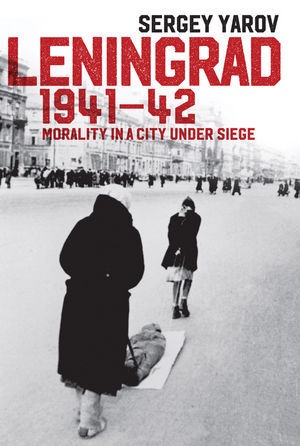Read more
This book recounts one of the greatest tragedies of the twentieth century: the siege of Leningrad. It is based on the searing testimony of eyewitnesses, some of whom managed to survive, while others were to die in streets devastated by bombing, in icy houses, or the endless bread queues. All of them, nevertheless, wanted to pass on to us the story of the torments they endured, their stoicism, compassion and humanity, and of how people reached out to each other in the nightmare of the siege.
Though the siege continues to loom large in collective memory, an overemphasis on the heroic endurance of the victims has tended to distort our understanding of events. In this book, which focuses on the "Time of Death", the harsh winter of 1941-42, Sergey Yarov adopts a new approach, demonstrating that if we are to truly appreciate the nature of this suffering, we must face the full realities of people's actions and behaviour. Many of the documents published here - letters, diaries, memoirs and interviews not previously available to researchers or retrieved from family archives - show unexpected aspects of what it was like to live in the besieged city. Leningrad changed, and so did the morals, customs and habits of Leningraders. People wanted at all costs to survive. Their notes about the siege reflect a drama which cost a million people their lives. There is no spurious cheeriness and optimism in them, and much that we might like to pass over. But we must not. We have a duty to know the whole, bitter truth about the siege, the price that had to be paid in order to stay human in a time of brutal inhumanity.
List of contents
Foreword by John Barber
Preface
Part I. Concepts of Morality in 1941-2
Chapter 1. The tragedy of Leningrad
The Time of Death
The breakdown of moral standards
Chapter 2. Moral commandments
The concept of honesty
Fairness
Charity
Attitudes to theft
Chapter 3. The shifting boundaries of ethics
Infringement of ethical standards: arguments used in self-justification
Compulsory ethical standards: coercion as a means of ensuring survival
Chapter 4. The influence of moral standards on people's behaviour
Appealing for help
Expressing gratitude for help
Part II. The Ethical Dimension
Chapter 1. The family: compassion, consolation, love
Chapter 2. Ethics within the family: continuity and disintegration
Funerals
Friends and family
Friends
Neighbours
Colleagues
Chapter 3. Party and Government
Rules of behaviour
Privileges
Chapter 4. Strangers
Parentless children
People collapsing in the streets
'Dystrophics'
Leningraders in the queue
Part III. Means of Reinforcing Morality
Chapter 1. Concepts of civilization
Art, creativity, reading
Tales of the siege
Tales about life in the past and future
Diaries and letters
Control
Chapter 2. Self-control
Codes of behaviour
Introspection
Leningraders in the Time of Death: human and superhuman
Notes
Index
About the author
Sergey Yarov (1959-2015) was Professor of History at the European University, St. Petersburg and Herzen Russian State Pedagogical University, as well as Senior Research Fellow at the St. Petersburg Institute of History of the Russian Academy of Sciences. His work focussed on 20th century Russian history and the Siege of Leningrad in particular. He was awarded the Likhachev Foundation's Antsiferov Prize in 2012 and the Dynasty Foundation's Educator ('Prosvetitel') Prize in 2014.
Summary
This book recounts one of the greatest tragedies of the twentieth century: the siege of Leningrad. It is based on the searing testimony of eyewitnesses, some of whom managed to survive, while others were to die in streets devastated by bombing, in icy houses, or the endless bread queues.
Report
"St. Petersburger Sergey Yarov was, until his cruelly premature death, one of Russia's leading historians, and in this spare, searing analysis of his home city's greatest disaster, he is at the height of his powers. Unlike conventional eulogies to siege heroism, Yarov's retrospective anthropology, drawing on hundreds of diaries and documents, shows us what he calls 'real people, irate, resentful, but still imbued with a sense of compassion'. Amid the horrors of disintegration and degradation, he testifies to how 'Leningrad saved itself through redeeming actions great and small'. An intensely moving and unforgettable book."
--Catriona Kelly, University of Oxford
"When most people in a great city were dying of hunger, some died faster than others. Some lived by privilege, by crime, or by the goodness of others. Some were empowered to decide which others would live or die. What does this tell us about their morality - and about our own rules of ethical behaviour? Sergey Yarov's study of wartime Leningrad is an unblinking inquiry into the depths of the human spirit."
--Mark Harrison, Warwick University
"While in Russia many historians of the siege ignored or minimized negative aspects of people's behaviour during it, Yarov shows both the self-sacrifice and the selfishness, the heroism and the egoism that were displayed at all levels of society. Leningrad 1941-42 is an outstanding book and one which sheds a great deal of new light on how people behave in extreme conditions. It will undoubtedly be of interest to a wide readership."
--John Barber, University of Cambridge
"This depiction of humanity in extreme circumstances has significance beyond the fate of a particular city and will make many readers wonder how they would behave in similar conditions."
--Times Higher Education
"An important work which contributes both to our understanding of the siege of Leningrad as well as to the nature of humanity itself."
--Times Literary Supplement

